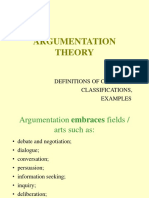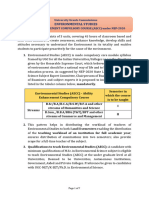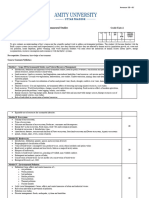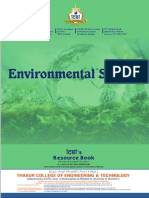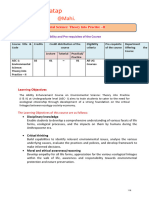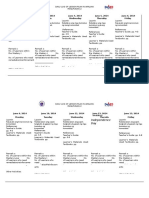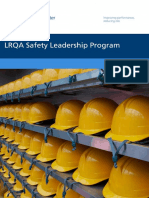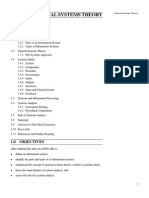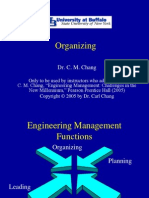0 ratings0% found this document useful (0 votes)
31 viewsNte213 Coastal Zone Management
Nte213 Coastal Zone Management
Uploaded by
znour alyThis course provides an overview of coastal zone management over 3 semester hours. Students will learn about coastal boundaries, ecosystems, resources, and development. They will examine techniques for managing coastal water quality, beaches, and protected areas. The course will also cover legal and institutional frameworks for coastal zone management in Turkey. Students will complete a project and presentation, midterm exam, and final exam to demonstrate their understanding of defining coasts, coastal properties, management, and sustainable development. The course will be delivered face-to-face with 3 hours of lectures per week plus additional individual study.
Copyright:
© All Rights Reserved
Available Formats
Download as PDF, TXT or read online from Scribd
Nte213 Coastal Zone Management
Nte213 Coastal Zone Management
Uploaded by
znour aly0 ratings0% found this document useful (0 votes)
31 views3 pagesThis course provides an overview of coastal zone management over 3 semester hours. Students will learn about coastal boundaries, ecosystems, resources, and development. They will examine techniques for managing coastal water quality, beaches, and protected areas. The course will also cover legal and institutional frameworks for coastal zone management in Turkey. Students will complete a project and presentation, midterm exam, and final exam to demonstrate their understanding of defining coasts, coastal properties, management, and sustainable development. The course will be delivered face-to-face with 3 hours of lectures per week plus additional individual study.
Original Title
nte213-coastal-zone-management
Copyright
© © All Rights Reserved
Available Formats
PDF, TXT or read online from Scribd
Share this document
Did you find this document useful?
Is this content inappropriate?
This course provides an overview of coastal zone management over 3 semester hours. Students will learn about coastal boundaries, ecosystems, resources, and development. They will examine techniques for managing coastal water quality, beaches, and protected areas. The course will also cover legal and institutional frameworks for coastal zone management in Turkey. Students will complete a project and presentation, midterm exam, and final exam to demonstrate their understanding of defining coasts, coastal properties, management, and sustainable development. The course will be delivered face-to-face with 3 hours of lectures per week plus additional individual study.
Copyright:
© All Rights Reserved
Available Formats
Download as PDF, TXT or read online from Scribd
Download as pdf or txt
0 ratings0% found this document useful (0 votes)
31 views3 pagesNte213 Coastal Zone Management
Nte213 Coastal Zone Management
Uploaded by
znour alyThis course provides an overview of coastal zone management over 3 semester hours. Students will learn about coastal boundaries, ecosystems, resources, and development. They will examine techniques for managing coastal water quality, beaches, and protected areas. The course will also cover legal and institutional frameworks for coastal zone management in Turkey. Students will complete a project and presentation, midterm exam, and final exam to demonstrate their understanding of defining coasts, coastal properties, management, and sustainable development. The course will be delivered face-to-face with 3 hours of lectures per week plus additional individual study.
Copyright:
© All Rights Reserved
Available Formats
Download as PDF, TXT or read online from Scribd
Download as pdf or txt
You are on page 1of 3
COURSE DESCRIPTION FORM
Course Code and Title NTE213 COASTAL ZONE MANAGEMENT
Semester 4
Catalog description Coast and coastal problems, boundaries, coastal zones and
subsystems of coastal waters, introduction to coastal ecosystems,
coastal resources and usage, development of sustainable
resources, management of coastal water quality, beach
management, management of marine and coastal protected areas,
techniques of coastal zone management, legal and institutional
situations in Turkey, coastal zone management in Turkey
Required reading 1. Institutional Arrangements for Managing Coastal
Resources and Environment by Sorensen and Mc Creary,
Coastal Man. Publ. no 1, National Park service, U.S.
Department of Interior, Washington D. C. 2nd Ed. 1990.
Recommended reading 2. Coastal Resources Management Guidelines by Snadeker
and Getter. Coastal Man. Publ. no 2, National Park
Service, U.S Department of Interior. Washington D. C,
1985
3. Marine and Coastal Protected Area: A guide for planners
and managers bv Salin. R. V. and Clark. IÜCN. Gland.
Switzerland, 1984.
4. Coastal Environments by Carter. Academic Press. 1988.
5. Coastal Ecosystem Management by Clark. John Wiley &
Sons. 1977
ECTS 3
Prerequisites and co-requisites No prerequisite. Required attendance to lectures is at least 70%
of total term hours.
Compulsory/Elective Non-technical elective course
Language of instruction English
Aim of course Teaching physical and ecological properties of coastal zones,
which are important for coastal zone management, sustainable
development and concepts of coastal zone management, sea and
coastal culture
Learning outcomes of the course unit Learning the definition of coast
Learning the physical and ecological properties of coasts
Learning the judicial aspect of coast
Learning the sustainable development and coastal zone
management
Getting a general idea about sea and coastal culture, technical,
environmental, sociological, historical, political and economic
properties of sea and coast.
Mode of delivery The mode of delivery of this course is face to face.
Course content 1) Coast and coastal problems, boundaries,
2) Coastal zones and subsystems of coastal waters,
3) Introduction to coastal ecosystems,
4) Coastal resources and usage,
5) Development of sustainable resources,
6) Management of coastal water quality,
7) Beach management, Management of marine and coastal
protected areas, techniques of coastal zone
management,
8) Legal and institutional situations in Turkey, coastal
zone management in Turkey
9) Midterm I
10) Project presentations and discussions
11) Project presentations and discussions
12) Project presentations and discussions
13) Project presentations and discussions
14) Project presentations and discussions
15) Project presentations and discussions
Planned learning activities and teaching 3 lecture hours per week (3+0)
methods Project preparation
Web search and library use
Report and presentation preparation
Midterm exam and required works
Final exam and required works
Assessment methods and criteria Quantity Percentage (%)
Mid-terms 1 30
Assignment - -
Exercises - -
Projects 1 30
Practice - -
Quiz - -
Contribution of
In-term Studies to - 60
Overall Grade %
Contribution of
Final Examination
- 40
to Overall Grade
(%)
Attendance - -
Workload Efficiency Total Week Weekly Total
Count Duration Workload
(in hour) in Semester
Theoretical Study Hours of 14 3 42
Course Per Week
Practicing Hours of Course 14 0 0
Per Week
Reading 14 0 0
Searching in Internet and 14 1 14
Library
Designing and Applying 14 0 0
Materials
Preparing Reports 7 1 7
Preparing Presentation 14 0 0
Presentation 14 0 0
Mid-Term and Studying for 1 10 10
Mid-Term
Final and Studying for Final 1 10 10
Other 0 0 0
Total Workload: 83
Total Workload / 25: 3,22
ECTS: 3
Course's contribution to program No Program Learning Outcomes 1 2 3 4 5
1 Adequate knowledge in mathematics,
science and engineering subjects pertaining
to the relevant discipline; ability to use
theoretical and applied knowledge in these
areas in complex engineering problems.
2 Ability to identify, formulate, and solve
complex civil engineering problems; ability
to select and apply proper analysis and
modeling methods for this purpose.
3 Ability to design a complex system, process,
device or product under realistic constraints
and conditions, in such a way as to meet the
desired result; ability to apply modern design
methods for this purpose.
4 Ability to devise, select, and use modern
techniques and tools needed for analyzing
and solving complex problems encountered
in civil engineering practice; ability to
employ information technologies and to use
at least one computer programming language
effectively.
5 Ability to design and conduct experiments,
gather data, analyze and interpret results for
investigating complex civil engineering
problems or discipline specific research
questions.
6 Ability to work efficiently in intra- X
disciplinary and multi-disciplinary teams.
7 Ability to work individually. X
8 Ability to communicate effectively in
Turkish, both orally and in writing; ability to
write effective reports and comprehend
written reports.
9 Knowledge of English of B1 level according
to Common European Framework of
Reference.
10 Prepare design and production reports, make
effective presentations, and give and receive
clear and intelligible instructions.
11 Recognition of the need for lifelong learning;
ability to access information, to follow
developments in science and technology, and
to continue to educate him/herself.
12 Consciousness to behave according to ethical X
principles and professional and ethical
responsibility.
13 Knowledge on standards used in civil
engineering practice.
14 Knowledge about business life practices
such as project management, risk
management, and change management.
15 Awareness in entrepreneurship, innovation;
knowledge about sustainable development.
16 Knowledge about the global and social
effects of engineering practices on health, X
environment, and safety, and contemporary
issues of the century reflected into the field
of engineering.
17 Awareness of the legal consequences of X
engineering solutions.
Name of lecturer and contact information Prof. Dr. Can Elmar Balas, cbalas@gazi.edu.tr
Prof. Dr. Lale Balas, lalebal@gazi.edu.tr
Assoc. Prof. Dr. Asu İnan, asuinan@gazi.edu.tr
You might also like
- Quantitative Dissertation Chapter Guides: Capella University 225 South Sixth Street, Ninth Floor Minneapolis, MN 55402Document40 pagesQuantitative Dissertation Chapter Guides: Capella University 225 South Sixth Street, Ninth Floor Minneapolis, MN 55402Keenly Pasion100% (1)
- Argumentation Theory - PresentationDocument67 pagesArgumentation Theory - PresentationRoxana Burlica100% (1)
- DLL Earth and Life Science Week 8 Ok PDocument3 pagesDLL Earth and Life Science Week 8 Ok PLily Mar Vinluan100% (2)
- Sustainable Coastal Management and Climate Adaptation: Global Lessons from Regional Approaches in AustraliaFrom EverandSustainable Coastal Management and Climate Adaptation: Global Lessons from Regional Approaches in AustraliaRichard KenchingtonNo ratings yet
- Marine and Maritime Studies ATAR Y12 Sample Course Outline WACE 2015 16Document5 pagesMarine and Maritime Studies ATAR Y12 Sample Course Outline WACE 2015 16partyNo ratings yet
- Environmental Studies - 29-10-2022Document7 pagesEnvironmental Studies - 29-10-2022Nisar FathimaNo ratings yet
- New SyllabusDocument4 pagesNew Syllabusyuvraaj.sehgalNo ratings yet
- Environmental StudiesDocument7 pagesEnvironmental Studieshypertaker04No ratings yet
- 1module Handbook Ekologi PerairanDocument2 pages1module Handbook Ekologi PerairanP2SDP GRESIKNo ratings yet
- Modeling and Monitoring CoastalDocument249 pagesModeling and Monitoring Coastalwindy candrayanaNo ratings yet
- Assignment: September 2019Document14 pagesAssignment: September 2019Algha PratiwaNo ratings yet
- 9693 AICE Marine Science Student Learner GuideDocument31 pages9693 AICE Marine Science Student Learner GuideAditi100% (1)
- Media To Upload1722851953Document8 pagesMedia To Upload1722851953Shankar KantharajuNo ratings yet
- OceanographyDocument6 pagesOceanographyginamgallanoNo ratings yet
- All Connect by WaterDocument8 pagesAll Connect by WaterEspaço Crescer (Centro de Estudos)No ratings yet
- MSI-Slides For IDP Week02Document41 pagesMSI-Slides For IDP Week02u2103207No ratings yet
- Summer School: Integrating Ecosystems in Coastal Engineering Practice (Inecep)Document5 pagesSummer School: Integrating Ecosystems in Coastal Engineering Practice (Inecep)Nella Bolivar CarbonellNo ratings yet
- Lesson 7Document2 pagesLesson 7vivian modestoNo ratings yet
- Wa0005.Document5 pagesWa0005.33abcreations18No ratings yet
- Environmental Education FYUGPDocument8 pagesEnvironmental Education FYUGPAnjan Kumar SinghNo ratings yet
- Course Title: Environmental Studies - IDocument4 pagesCourse Title: Environmental Studies - IAkash YadavNo ratings yet
- New SyllabusDocument7 pagesNew SyllabusAmitNo ratings yet
- Environmental Studies I - Ii SemDocument7 pagesEnvironmental Studies I - Ii SemAdesh KNo ratings yet
- SyllabusDocument48 pagesSyllabusmoniraNo ratings yet
- EVS Common Curriculum Syllabus NM MithibaiDocument8 pagesEVS Common Curriculum Syllabus NM MithibaiYash TathedNo ratings yet
- Course Title: Fundamentals of Environmental Studies: Credit Units:2 Course Code: ESCM114 Course Level-UGDocument7 pagesCourse Title: Fundamentals of Environmental Studies: Credit Units:2 Course Code: ESCM114 Course Level-UGanuj sharmaNo ratings yet
- VAC 2 Environmental Studies 1Document4 pagesVAC 2 Environmental Studies 1pd62658mNo ratings yet
- CivschsyllDocument3 pagesCivschsyllSangeetha RaoNo ratings yet
- SessionPlans - 51caaCDP AsfaDocument11 pagesSessionPlans - 51caaCDP Asfayuvrajv219No ratings yet
- 18CH2001 Lecture 1Document40 pages18CH2001 Lecture 1joyaeroNo ratings yet
- EContent 7 2024 10 17 11 03 24 Syllabuspdf 2024 07 17 09 20 11Document3 pagesEContent 7 2024 10 17 11 03 24 Syllabuspdf 2024 07 17 09 20 11claudinasabonete5No ratings yet
- 2 - PKPT Iczm 2017 PDFDocument38 pages2 - PKPT Iczm 2017 PDFddsNo ratings yet
- Marine and Maritime Studies ATAR Y11 Sample Course Outline WACE 201516Document6 pagesMarine and Maritime Studies ATAR Y11 Sample Course Outline WACE 201516partyNo ratings yet
- EVS SyllabusDocument3 pagesEVS SyllabusSuman PradhanNo ratings yet
- Marine Biology Voyage Syllabus Broadreach: Credit InformationDocument5 pagesMarine Biology Voyage Syllabus Broadreach: Credit InformationDunmi AlabiNo ratings yet
- Notification NCCR Project Scientist Technical Asst Other PostsDocument23 pagesNotification NCCR Project Scientist Technical Asst Other PoststamilarasansrtNo ratings yet
- Ministry of Earth Sciences (Moes)Document23 pagesMinistry of Earth Sciences (Moes)Harshit DubeyNo ratings yet
- Marine Fisheries - Introduction and Status PDFDocument76 pagesMarine Fisheries - Introduction and Status PDFaldrinNo ratings yet
- Ecological PlanningDocument12 pagesEcological Planningy2kareinNo ratings yet
- Zero LectDocument20 pagesZero LectShivang AgrawalNo ratings yet
- Ocean Governance 3 - 8 1Document5 pagesOcean Governance 3 - 8 1laura.muhvicNo ratings yet
- Aec (31.10.22) EvsDocument7 pagesAec (31.10.22) EvsPRANJAY ROHILLANo ratings yet
- TCET FE Environmental Studies (2018-2019)Document219 pagesTCET FE Environmental Studies (2018-2019)KevinNo ratings yet
- Sosialisasi Ilmu KelautanDocument7 pagesSosialisasi Ilmu Kelautannajwankamil41No ratings yet
- Course Handout - ESEA301LDocument3 pagesCourse Handout - ESEA301LSukrit ChatterjeeNo ratings yet
- 1715201872587175Document3 pages1715201872587175Aakash ShuklaNo ratings yet
- Draft - Alternative Midterm ExamDocument3 pagesDraft - Alternative Midterm ExamToni Marie P. LopezNo ratings yet
- An Integrated Coastal Zone Management (Iczm) Project: Coastlearn in Black Sea (CLBS)Document7 pagesAn Integrated Coastal Zone Management (Iczm) Project: Coastlearn in Black Sea (CLBS)donnaNo ratings yet
- Guia Docent 250584 2024Document6 pagesGuia Docent 250584 2024Dr-Ragaa AballahNo ratings yet
- Aquatic Pollution and Wastewater Management Syllabus - 2022Document3 pagesAquatic Pollution and Wastewater Management Syllabus - 2022zirakumacoralineNo ratings yet
- Strategic Adaptive Management SAM Guidelines For Effective Conservation of Freshwater EcosystemsDocument44 pagesStrategic Adaptive Management SAM Guidelines For Effective Conservation of Freshwater EcosystemsJorge Alvarez TejadaNo ratings yet
- Emp 410 Course Outline 2021 Sep-DecDocument3 pagesEmp 410 Course Outline 2021 Sep-DecDenis OgutuNo ratings yet
- Aec Syllabus FinalDocument17 pagesAec Syllabus FinalLucky SharmaNo ratings yet
- Part III: Nature Areas Stewardship Plan: Acknowledgements Foreword Executive Summary Part I: Foundation of The PlanDocument47 pagesPart III: Nature Areas Stewardship Plan: Acknowledgements Foreword Executive Summary Part I: Foundation of The PlanPeterborough ExaminerNo ratings yet
- Thesis SynopsisDocument3 pagesThesis SynopsisGandham Kiran Ji100% (1)
- Elec 421: Environmental Issues and PoliciesDocument20 pagesElec 421: Environmental Issues and PoliciesIve EspiaNo ratings yet
- Integrated Management of Coastal ZonesDocument6 pagesIntegrated Management of Coastal ZonesRemon MorcosNo ratings yet
- Environmental Science SyllabusDocument6 pagesEnvironmental Science SyllabusNaron Jan AianNo ratings yet
- S.T. Semester - IV: Course ObjectivesDocument3 pagesS.T. Semester - IV: Course ObjectivesPraniti PatilNo ratings yet
- FINAL MSMB Syllabus For MBD 210 Marine Biodiversity Concepts and PrinciplesDocument16 pagesFINAL MSMB Syllabus For MBD 210 Marine Biodiversity Concepts and PrinciplesAlinasser A. YusopNo ratings yet
- #Mahii..EVS-ll Sem.4..SyllabusDocument6 pages#Mahii..EVS-ll Sem.4..Syllabuskinggoes2110003No ratings yet
- Toaz - Info Introduction To Transportation Planning and Engineering PRDocument6 pagesToaz - Info Introduction To Transportation Planning and Engineering PRznour alyNo ratings yet
- IELTS Writing Task 2, Planing Technique: Five Rules For The Five Minutes PlanningDocument3 pagesIELTS Writing Task 2, Planing Technique: Five Rules For The Five Minutes Planningznour alyNo ratings yet
- Under AgeDocument1 pageUnder Ageznour alyNo ratings yet
- Chapter - 1: Introduction To Probability and Statistics For Civil EngineeringDocument18 pagesChapter - 1: Introduction To Probability and Statistics For Civil Engineeringznour alyNo ratings yet
- Ce371 hw1Document2 pagesCe371 hw1znour alyNo ratings yet
- Ce 371 Homework 3 1) A Gate Having The Shape in The Figure IsDocument3 pagesCe 371 Homework 3 1) A Gate Having The Shape in The Figure Isznour alyNo ratings yet
- Ce225 Statistics For Civil Engineers Midterm Examination IDocument2 pagesCe225 Statistics For Civil Engineers Midterm Examination Iznour alyNo ratings yet
- Chapter Three: Pressure and Fluid StaticsDocument84 pagesChapter Three: Pressure and Fluid Staticsznour alyNo ratings yet
- Mat 202Document2 pagesMat 202znour alyNo ratings yet
- Ce371 Homework Quiz ResultsDocument3 pagesCe371 Homework Quiz Resultsznour alyNo ratings yet
- Ce 371 Homeexercise-3 1) A Plug in The Bottom of A Pressurized TankDocument3 pagesCe 371 Homeexercise-3 1) A Plug in The Bottom of A Pressurized Tankznour alyNo ratings yet
- Nte209 Special Topics AgricultureDocument3 pagesNte209 Special Topics Agricultureznour alyNo ratings yet
- Im 226Document2 pagesIm 226znour alyNo ratings yet
- Ce101 Compressive Strength of Concrete Name SurnameDocument4 pagesCe101 Compressive Strength of Concrete Name Surnameznour alyNo ratings yet
- Helmut Lachenmann Concept of Rejection PDFDocument11 pagesHelmut Lachenmann Concept of Rejection PDFjosebaroniNo ratings yet
- The Teacher As A Vital Link Between The School and CommunityDocument14 pagesThe Teacher As A Vital Link Between The School and CommunityFaye LannaNo ratings yet
- Ob Module 1Document9 pagesOb Module 1harshNo ratings yet
- EappDocument9 pagesEappgaeNo ratings yet
- Probabilistic Reasoning in Artificial IntelligenceDocument14 pagesProbabilistic Reasoning in Artificial Intelligenceermiyaszewdu266No ratings yet
- DLL Araling Panlipunan 2Document42 pagesDLL Araling Panlipunan 2MarxPascualBlanco100% (2)
- Dana Stuckers Resume Teaching PortfolioDocument2 pagesDana Stuckers Resume Teaching Portfolioapi-284930827No ratings yet
- Softball Semi Lesson PlanDocument2 pagesSoftball Semi Lesson PlanRoselle Moliva Cimafranca100% (1)
- Primary 1 TBDocument189 pagesPrimary 1 TBFaraj Alferjani100% (2)
- Spitzberg, Brian H. (2006) Preliminary Development of A Model and Measure of Computer-Mediated Communication (CMC) Competence PDFDocument38 pagesSpitzberg, Brian H. (2006) Preliminary Development of A Model and Measure of Computer-Mediated Communication (CMC) Competence PDFcdavid_359967No ratings yet
- 2nd Semester - q1 - Summative Test 1 in Pr1Document2 pages2nd Semester - q1 - Summative Test 1 in Pr1Jessa SumayangNo ratings yet
- итоговая работа - Муканов - АблайDocument113 pagesитоговая работа - Муканов - АблайAbylay MukanovNo ratings yet
- Study File 8Document19 pagesStudy File 8Leones JessiejuneNo ratings yet
- Title: Intervention Strategies For Learners in Physical EducationDocument1 pageTitle: Intervention Strategies For Learners in Physical EducationJessica AntonioNo ratings yet
- Undecidable Problems About Turing MachinesDocument16 pagesUndecidable Problems About Turing MachinesNorazizan MuhamadNo ratings yet
- ChenSuLi-Machine Learning For Different Calligraphy Style Recognition-ReportDocument5 pagesChenSuLi-Machine Learning For Different Calligraphy Style Recognition-ReportromeoNo ratings yet
- IAREP SABE BrochureDocument19 pagesIAREP SABE BrochurejoelsnowNo ratings yet
- Grade 7-10 MathematicsDocument18 pagesGrade 7-10 MathematicsChierynNo ratings yet
- Motivation and EmotionDocument4 pagesMotivation and EmotionReinaNo ratings yet
- Question 1: Circle The Letter That Corresponds To The Correct AnswerDocument2 pagesQuestion 1: Circle The Letter That Corresponds To The Correct AnswerBishoy EmileNo ratings yet
- Iii Reaction-PaperDocument39 pagesIii Reaction-PaperMara Rosseth Maicle-FloresNo ratings yet
- Organizational Behavior (Unit 1) NotesDocument12 pagesOrganizational Behavior (Unit 1) NotesTanya ChauhanNo ratings yet
- LRQA Safety Leadership Programme BrochureDocument12 pagesLRQA Safety Leadership Programme BrochureVishal B. ChavanNo ratings yet
- INformstion SystemsDocument20 pagesINformstion SystemsvikeeeeeNo ratings yet
- EUROLAB Cook BookDoc No 1 Selection Verification and Validation of MethodsRev 2017Document3 pagesEUROLAB Cook BookDoc No 1 Selection Verification and Validation of MethodsRev 2017nedkovbgNo ratings yet
- Organizing: Dr. C. M. ChangDocument86 pagesOrganizing: Dr. C. M. ChangkingrabiNo ratings yet
- Sample RationaleDocument2 pagesSample Rationaleriselle alfilerNo ratings yet
- RPH Bi THN 2 New 6 - Unit 9 (LP 126-160)Document34 pagesRPH Bi THN 2 New 6 - Unit 9 (LP 126-160)Dezzary LatiffNo ratings yet

